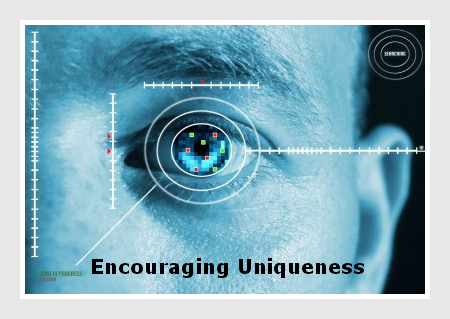
Feb 27, 2013
Husbands and wives are different.
Just being a male and a female ensures you won’t be alike. Physically that’s true. There are books written about how men and women think and process ideas differently. ( Books like: Men Are Like Waffles–Women Are Like Spaghetti: Understanding and Delighting in Your Differences .)
.)
But uniqueness goes deeper than the physical and the mental ways husbands and wives connect. You know what I’m talking about – your spouse is not like anyone else in this universe and all eternity.
In what ways is your spouse unique?
Have you ever made a list of ways – a combination of qualities – your spouse is unlike anyone else you know? (Hey now – I’m talking about the good stuff! Stay with me…)
Robert and I are together most days – all day. We write and work from home unless we’re with clients or traveling to speak. (Though we even do that together sometimes.) I’ve known Robert since he was 17 years old. We know each other very well – so well that sometimes he just looks at the expression on my face and can “read” me. Conversely, I know what he’s feeling when his lips are held tight together and colorless. (Not a good sign, btw)
You’d think that with all this time together we’d run out of things to talk about or always agree because we’re so meshed together. Not true. At all.
Robert is unique – God has made this man special in every way. He usually comes at any task or challenge in a way that I would not have considered. And visa-versa. He knows me so well – yet he says I surprise him constantly. It’s deeper than just a male/female thing.
Our uniqueness is God-given. God designed. And ever-growing.
I’m guessing you realize that the person you married is not the same today as when you were first married. We all grow and change – that process alone makes us unique. Our walk with God – our depth of faith and experiences of faith cause us to grow. Sometimes it’s the hardships and challenges that develop our uniqueness especially quickly.
Do you know the unique person your spouse is today? Or are you only assuming he or she is the same…
Take time to consider your spouse’s unique qualities.
~~~~~~~~~~
How? One way is to pull out all the photos.
I did this last week. I was looking for a specific photo of Robert taken on the day we were engaged 30 years ago. That led to a few hours of a photo safari. An emotional safari. So many good and happy moments are documented in pictures. There’s also sadness because people are no longer in our lives because of death or circumstance. There are even emotions of regret and longing because certain aspects will never be experienced again.
In those photos I saw Robert go from a teenager, to a young husband, move forward to a young father, then in business, back to University, serving God in many capacities, navigating a corporate career, and leading at home, at work and in faith.
Some qualities have remained the same – Robert’s dedication and pursuit of a relationship with Christ, his gentleness and his consistent optimism. Other qualities have shown up over the years like wisdom and focus and fortitude.
(And before you go and roll your eyes – yes… both Robert and I have faults. Ha. We show our uniqueness-es in our areas of weakness too. But this post is about encouragement while focusing on strengths.)
Identifying Uniqueness
Before you can encourage your spouse’s uniqueness, you need to identify what it is about your spouse that is unique. Some of us don’t give this much thought.
Perhaps in a summer or spring season of marriage it’s not too hard to think about the positive uniqueness of your spouse. However, I’d imagine focusing on positive uniqueness-es is more difficult if you’re going through a winter season in your marriage – where there’s a lot of chilly moments, with emotional gales and blizzards. (Read Gary Chapman’s The 4 Seasons of Marriage: Secrets to a Lasting Marriage to delve into this concept.)
to delve into this concept.)
Are you struggling to put into words what is unique about your spouse?
Can you identify the values that are important to your spouse – qualities which are non-negotiables? Robert has been working with values for a number of years now. He’s defined over 400 values. If you’re struggling to identify your spouse’s unique qualities, download Robert’s free eBook – all the value words are there at the end of the book.
Go through the list of 423 words and mark off those values – qualities – that you identify as uniquely belonging to your spouse. There will be a collection.
And before you think that anyone can have the same collection – it’s not true.
Robert does an exercise in his presentations with groups of 50 – 80 and more than 100 people. He has them go through these 400+ words and choose their top 3 values. Then he requests one person to read their top 3 values. He asks the group if anyone else shares at least one of these values. A number of hands will rise. He then asks if these people share two of the same values as the chosen person. Many hands drop. Lastly he asks if any of the people with their hands still raised share all three of the values of the chosen person… In every exercise, not one hand remains raised. The chosen person who first read his top three values is unique in that room. No one shares his 3 values. (If it would happen that there was another person in the room with the same values, Robert would ask them what their 4th value was – it’s almost numerically impossible to match 4 values.)
Encouraging your spouse’s uniqueness.
~~~~~~~~~~~~
Now that you know your spouse’s unique qualities or values – how can you encourage your spouse in that area?
Start small. Talk about what you believe are your spouse’s unique qualities. Your first goal is to be sure that she or he also feels those qualities are positive.
- Affirm your spouse’s uniqueness by noticing when they’re using that value. Encouragement is about being present and paying attention.
- Help along. Become invested in those areas of uniqueness in your spouse. Look for ways in which to complement (enhance & complete) those qualities in your spouse. God put you two together for reason!
- Pray for your spouse – ask God to use your spouse in His way to glorify Him. (after-all, it’s God that made your spouse unique)
- Accept with grace your spouse’s unique qualities. Stop kvetching. Remove the conditions and move toward embracing your spouse’s uniqueness. Love your spouse without the barrier of your own opinions.
- Look Forward – There will be ways in which God will open avenues and opportunities for your spouse. Our Great God is about possibility. There is nothing that can stand in the way of His will. (Unless it’s us humans who use the gift of free will to get in His way.)
God made your spouse unique – your husband or wife is special.
 Just like no two snow-flakes are the same, and even identical twins (paternal/maternal from the same egg & sperm) are not the same and no finger print or iris pattern is identical…
Just like no two snow-flakes are the same, and even identical twins (paternal/maternal from the same egg & sperm) are not the same and no finger print or iris pattern is identical…
your spouse is unique.
In what ways is your spouse unique?
Leave a comment – let’s share the uniqueness of the wife or husband God has given us!
How has your spouse shown this uniqueness? How have you encouraged her or him?

This post contains affiliate links: the price of purchase remains the same for you… we just get a few pennies. Thank you for your support!


Feb 22, 2013
To be meshed.
To be interlocked.
To be embedded, built into or attached to another part.
It isn’t just a time period preceding marriage.
Engagement

Do you still use a wrist watch? Most of us don’t even own a watch because our smart-phone has become our source of information – even for the time.
But you must remember regular, old-fashioned clock-work mechanisms found either in old wrist watches, or clocks? They are a complex series of gears. The power is stored in the mainspring by winding it up, and with the use of wheels, the gears are linked by friction or gear teeth.
Three things are needed for this kind of clock-work:
- the mainspring must be wound to create energy
- the power of the mainspring turns the clockwork’s gears, until the stored energy is used up
- the gears, or wheels need to be engaged for the clock to work
Being Engaged with Your Spouse
We celebrate when a couple decides to become engaged. They’ve committed to intertwine their lives and become one with each other. To be meshed. To be interlocked. To be embedded, built into and attached to each other.
Physically they remain two people – two bodies. But in a Godly, spiritual sense they are looking forward to becoming “one flesh”.
I’d like to suggest that our time of engagement should continue into marriage…
Imagine.
Two people – husband and wife – working together like clock-work. They’re separate and yet enmeshed – their ability to move and work together becomes a blessing for others. Their source of energy to continue working together comes from God – the One who “winds them up”.
Becoming Engaged & Filled with Energy
Are you and your spouse enmeshed with your gears touching – are you wound up and filled with energy to keep moving? Perhaps it’s time to seek the source of all power and become filled with energy again?
How?
If there is a disparity
between your inner world
and your outer world
– your world will collapse.
~ Christine Caine
We can’t see the gears and wheels inside a clock or watch. They’re covered up. We can see and experience if that watch is working or not. The outer experience reflects the inner workings.
If you and your spouse need to become engaged again, to become filled or wound with energy – begin inside. Not the body – but the soul. Check yourself into the clock-maker’s workshop for a tune-up.
In Ken Blanchard and Phil Hodges’ book, Lead Like Jesus, the authors suggest four areas be addressed. One of the areas is Habits.
Jesus stayed on track with His mission by applying five key habits that countered the negative forces in His life:
- Solitude
- Prayer
- Study and application of Scripture
- Accepting and Responding to God’s unconditional love
- Involvement in supportive relationships
~ from the chapter “The Habits of a Servant Leader” in Lead Like Jesus
How are you and your spouse doing with these habits?
Are you setting aside time to be alone – and to be alone together? Are you praying together – studying and applying scripture to your life? Do you know and feel that God is for you – that He loves you? Are you surrounding yourself with other supportive couples?
Fortify your life together with Faith
Perhaps your spouse isn’t ready to do this with you – yet. There’s nothing stopping you from beginning the process and allowing God to work in His time…
Have you and your spouse remained engaged?
How?
What are your thoughts? Leave a comment and share…
Linking with
Faith Filled Friday | Fellowship Friday | Teaching What is Good

Dec 14, 2012
Trusting God for direction in your marriage – yeah, about that — I’ve been thinking a lot about Mary and Joseph and how they’re a relevant and good example for all of us. Yes, even today – 2000+ years in the future.
It all started when I read this post by Falen at the blog “Upward Not Inward”. She highlighted Elizabeth. You know, Mary’s cousin – the mother of John the Baptist. After the angel Gabriel visited the young teenage girl and explained what God was going to do in her life, Mary ran to Elizabeth.
I’ve been thinking about Joseph and Mary and how they demonstrated the quality of trust.- trusting God for direction in their life.
Trust in God.
Mary trusted God.
- she trusted God enough that she didn’t freak out when the angel appeared. (Although it does say she was “troubled”.)
- she trusted God enough that she wanted what God had designed for her – even though she could have counted the troubles she would need to face: telling her fiance, her family, and the community about her pregnancy and dealing with disbelief and gossip.
- she trusted God enough that she declared herself God’s servant
Joseph trusted God.
- Joseph trusted God’s message in his dream (Matthew 1:20,21) and when he
woke up from that dream, took the young, pregnant Mary as his wife. No prevarication, or hesitation – he trusted God’s direction to move forward – immediately.
- Again, once Jesus was born, an angel appeared to Joseph in a dream. (Matthew 2:13,14) Joseph trusted God’s direction enough to take immediate action.
- And yet more times – Matthew 2:19-23 – Joseph trusted God enough to uproot his family again and again. Joseph was a carpenter – he needed people to hire him to build things. He was required to find new clients every time he moved. His livelihood and providing for his family was at risk with every move. Yet Joseph trusted God enough to follow through immediately.
Trusting God for direction was a solid way to begin a marriage for Mary & Joseph.
 You might think they found it easier to trust God than we do today. I don’t think so. Humankind is the same today, as yesterday, as thousands of years ago.
You might think they found it easier to trust God than we do today. I don’t think so. Humankind is the same today, as yesterday, as thousands of years ago.
There was gossip – today and then. I’m positive that people enjoyed chewing on Joseph and Mary’s situation, in the same form we hear in our circles today. (but we’re not participating in the gossip… oh no… right? …)
Joseph and Mary needed to earn enough to feed and clothe their family – as we do today.Do you think Joseph was any less worried as a husband and father about providing for his family, compared to husbands today?
I imagine he talked a lot to God about his situation and asked where their “daily bread” would come from as they moved again and again at God’s direction.
Did that young family feel isolated in Egypt? I imagine it’s the same as some young families feel today when they’re far away from loved ones. I think so. As I understand, Mary didn’t have any support system in Egypt – no mother, sisters, or cousins. She had Joseph. And a bunch of strangers surrounding her in her first years of marriage.
Yet, as husband and wife, Joseph and Mary trusted God’s direction for their life.
How about you? Do you give God control over the direction of your life?
It’s all about trust.
- Was there a point in your life that you trusted enough to surrender your future to God?
- Do you need to revisit this commitment?
- Perhaps it’s time for you to do this with your spouse…
In what way are you trusting God for direction today?
Does your spouse know how you’re trusting God for direction? Have you asked her/him? It’s a good time to have a conversation, huh? 😉

Oct 22, 2012

Encouragement is like a glass of clear, clean, cold water – it refreshes.
What would you call the glass of dirty water with “floaties”?
(it’s not encouragement)
Which are you offering your spouse?

Inspire with Hope – Encouraging by looking forward with optimism.
Fortify with Faith – Encouraging by using your strong faith in God.
Foster with Love – Encouraging by loving without condition.
Uplift with Prayer – Encouraging by taking all your spouse’s concerns to God.
Support with Action – Encouraging by being that extra pair of hands to help.

Sep 11, 2012
“Hearers interpret our questions and comments from their own perspective. Perhaps we should spend a bit more time encouraging and building confidence in others so they have the ability to see things from a “can do” approach.”
~ Dan Rockwell – Leadership Freak – from a comment on a blog post
(I kept the above quote in my stash of ideas and today was the perfect prompt for this post. You’ll find out from where this post started in a few paragraphs.)
Crafting our Questions
Our words have the power to build or destroy – and questions are no different.
Using Dan Rockwell’s point that “hearers interpret our questions and comments from their own perspective”, we need to be aware of our spouse’s perspective when sharing or questioning.
If your spouse has a naturally optimistic outlook, and hears your words from a positive perspective, the way you craft your questions remains important and will impact conversations, and you’re one step further down the road.
However, if your spouse wears a pessimistic outlook -or maybe they call it a realistic outlook – then how you craft your questions is vital.
An Illustration
This is a real conversation I overheard on Sunday with a 50-ish person and a University Student.
To start the conversation, the 50-ish person asked, “What’s your worst subject?”
Can you guess which direction the conversation went?
It quickly spiraled downward, with concerns about the content of the course, and the teacher. Then the conversation carried on with comments on the teacher’s country of origin, how the political system is impacting the state of education etc. etc. etc. To be candid, I stopped listening after a while. It was depressing.
Is this a blatant illustration? Yup. But it happened!
Imagine the direction the conversation could have gone if the 50-ish person had asked “What’s your best subject?” We could have left the conversation feeling empowered and uplifted. (Instead of the indignant emotion I’m still experiencing – hence this blog post!*)
Although this was just a short, passing conversation between friends, could it happen that a husband or wife would ask about a workday or experience using this kind of pronounced negativity? Hmm.
Before you ask…
Take Responsibility.

You know your spouse. You’ve lived together for a bit – or a bit longer than a bit. There’s every chance you have experience in how your spouse will respond to a conversational direction.
Before asking a question, use your intuition to sketch a possible path the conversation may take – anticipate. Will your question lead you both toward a place you want to dwell? Will this question lead you both to feel encouraged, confident and capable?
I want to be clear – this kind of analysis is not manipulation. It’s merely taking responsibility for our questions.
Being aware of our questions, and their outcomes, is one way to encourage, build confidence and foster the ability to see things from a “can do” approach.
Phrase your questions to:
- Look Forward. Pointing fingers, dwelling on blame and dissecting the past is part of a backward question like “What should we have done?” Instead of squinting backward – turn forward. Ask: “What can we do next time?” See Dan Rockwell’s post: “There are stupid questions.”
- Inspire. Dismantle the roadblocks. Ask questions to excite your spouse. Ask questions that’ll tickle their fancy, open their eyes to new possibilities, and touch that small part of every human that dreams of something more…
- Be Useful. Be succinct, and relevant. Asking useful questions usually includes topics that matter right now. Sometimes being useful is asking questions that bring scary answers – our job is to phrase the question in a way that makes “scary” lead to “able”.
How do you ask “can do” questions?
*Post Script: This 50-ish individual knows my focus on being positive and it’s quite possible the 50-ish person deliberately chose to start the conversation with our University Student friend this way just to push my buttons… It worked. (sigh)

.)
to delve into this concept.)
 Just like no two snow-flakes are the same, and even identical twins (paternal/maternal from the same egg & sperm) are not the same and no finger print or iris pattern is identical…
Just like no two snow-flakes are the same, and even identical twins (paternal/maternal from the same egg & sperm) are not the same and no finger print or iris pattern is identical…





 You might think they found it easier to trust God than we do today. I don’t think so. Humankind is the same today, as yesterday, as thousands of years ago.
You might think they found it easier to trust God than we do today. I don’t think so. Humankind is the same today, as yesterday, as thousands of years ago.










-01.png)

